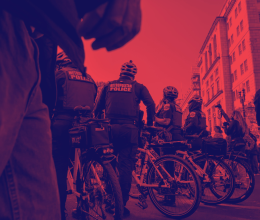Statement on behalf of the
American Civil Liberties Union of the District of Columbia
DC Council Committee on Facilities and Procurement
Hearing on B23-0886, the “Washington Metropolitan Area Transit Authority Police Accountability Amendment Act of 2020,”
by
Monica Hopkins, Executive Director
October 27, 2020
Hello, Councilmember Robert White and members of the Committee. My name is Monica Hopkins and I am the Executive Director of the American Civil Liberties Union of the District of Columbia (ACLU-DC). The ACLU-DC is committed to working to dismantle systemic racism, improve police accountability, safeguard fundamental liberties, and advocate for sensible, evidence-based solutions to public safety and criminal justice policies. I present the following testimony on behalf of our 13,500 members, in support of Bill 23-886 – the “Washington Metropolitan Area Transit Authority Police Accountability Amendment Act of 2020”. This legislation is long overdue.
Introduced by Councilmembers Robert White, Allen, and Chairman Mendelson on September 8, the purpose of Bill 23-886 is to provide better oversight and accountability of Washington Metropolitan Area Transit Authority (WMATA or Metro/Transit) Police. As introduced, the bill bars the Metro Transit Police Department (MTPD) from using quotas to evaluate, incentivize, or discipline members, including number of arrests made or citations and warnings issued. The bill also creates a civilian complaints board for filing complaints against Metro police.
We applaud Councilmember Robert White for his leadership and recognize the important steps the Council has already taken by removing criminal penalties for fare evasion, and including a subtitle with these provisions in the Comprehensive Policing and Justice Reform Second Temporary Amendment Act of 2020, passed this July. We strongly urge the Council to pass Bill 23-886 and offer recommendations to strengthen the bill.
Abusive practices by Metro police are not new phenomena. Indeed, years of complaints, advocacy, and litigation by community members, advocates, and the ACLU-DC demonstrate a systemic pattern of unnecessary excessive use of force by MTPD officers—primarily targeting the District’s Black, Brown, and low income communities. Allegations of selective enforcement and unnecessary use of force by Metro Transit police even prompted Councilmembers Robert White and Allen to hold a hearing on the agency’s practices. In most cases, members of the public are stopped and harassed over issues that pose no immediate danger to the public, such as eating at a Metro station or fare evasion. Just this summer, the ACLU-DC settled a suit against an MTPD officer who forcibly removed a Black woman from a Metro station for no reason.
On the evening of June 22, 2019, a member of the public captured on video an incident in which MTPD Officer Jonathan Costanzo tased Metro customer Tapiwa Musonza, as he was verbally advocating for a teenager detained by officers on a platform at the U St.-Cardozo Metro station. In 2018, a MTPD officer pinned down a 24-year-old woman accused of fare evasion and intimidated her with a taser at the Ft. Totten Metro station. The officer also ripped her shirt, exposing her chest. In another 2018 incident, Diamond Rust, a 20-year-old woman presumed to have evaded bus fare, was tackled by MTPD officers in front of her two small children. The incident caused multiple injuries. In June 2017, a man was stopped, pinned to the ground, and pepper-sprayed in the Gallery Place Station. Residual spray caused choking and eye irritation to other customers in the area.
In October 2016, a teenager was grabbed and her legs kicked out from under her by Metro officers, who arrested the teenager for eating chips and a lollipop in the Columbia Heights Metro station. Video footage of the incident shows an officer hooking his arm in the teen’s elbow and then kicking the back of her knees, forcing her to the ground, and then pushing her back down when she propped herself up against a wall. Far from an exhaustive list of incidents, these examples of unwarranted use of force by MTPD officers show the types of abusive practices that continue a long history of violence against Black and Brown communities by law enforcement—practices that continue erosion of the community’s trust in police.
A 2018 report by the Washington Lawyers’ Committee revealed that 91 percent of citations and summonses by Metro police were issued to Black people, while only eight percent were issued to white people. Citations and summonses were disproportionately issued to Black men. Even Black children as young as seven years old were stopped. The report also found that MTPD officers targeted Metro stations that are heavily used by youth of color, with 15 percent of all stops in or around Gallery Place Station and 14 percent in or around the Anacostia Station.
As if the highlighted incidents and data above were not disturbing enough, a February Washington Post article revealed that a supervisor in WMATA’s District 1 police station created a weekly competition that encouraged officers based in Fort Totten to make arrests and other enforcement actions. Though this “contest” lasted only one month, it confirmed to many community members long-held concerns about Metro police being under pressure to make arrests in order to meet quotas. There is no telling how long this practice would have continued, and how many innocent lives it would have impacted, had it not been brought to the attention of a top commander or an anonymous complaint not been sent to Councilmember Allen’s office.
The use of quotas in policing is harmful to both members of the community and officers. When quotas are used to incentivize performance (e.g., promotions), officers are pressured to focus on making arrests and citations for conduct that does not require such an aggressive response. That, in turn, results in more people needlessly thrust into the criminal justice system, where even an arrest record can lead to a slew of collateral consequences that can affect people’s careers and families. Moreover, since Metro Transit officers have a history of disproportionately targeting Black and Brown people, quotas likely exacerbate racial inequality and hold back communities of color.
ACLU-DC Recommendations:
What is clear from the above account is that past calls for more oversight, and even the decriminalization of fare evasion, have not halted Metro Transit officers’ abusive behavior towards riders and has certainly not led to greater accountability. That is why the Council must act. The ACLU-DC supports this legislation, but strongly recommends that the Council bolster its protections through the recommendations that follow to ensure that riding the metro is a safe activity for everyone.
The ACLU-DC supports the creation of a Police Complaints Board (PCB) to review complaints filed against Metro police, and agrees that members of this Board should not be WMATA employees or have any current affiliation with law enforcement. Bill 23-886 grants the Board authority to receive and review complaints, as well as dismiss, conciliate, mediate, investigate, adjudicate, or refer complaints to the Metro Transit Police for further action. But as we have noted in previous testimony with regards to the Metropolitan Police Department, police cannot be reasonably expected to police themselves. Therefore, authorizing the Board merely to refer complaints back to Metro Transit Police defeats the purpose of having third-party oversight. To ameliorate this weakness, we recommend that the Council expand the WMATA Police Complaints Board’s role by granting it the authority to impose or, at minimum, recommend disciplinary action. We also suggest that any discipline made by the Board be made publicly accessible.
With regards to the Board’s investigative powers, we also recommend authorizing the Board to institute investigations sua sponte if it discovers additional forms of misconduct while conducting an investigation (e.g., during review of body-worn camera footage). Additionally, the list of incidents that PCB can investigate omits claims of unlawful searches and seizures. The Board should be authorized to investigate any incident involving a violation or potential violation of federal or local law by a Metro Transit officer.
Finally, when negotiating to settle lawsuits involving alleged Transit Police misconduct, WMATA insists on a non-disclosure agreement as part of the settlement. The non-disclosure agreement covers not only the amount of the settlement, but the very existence of the lawsuit, including the name(s) of the officer(s) involved. Because of this policy, the ACLU-DC, for example, cannot tell the Council about most cases we have filed against WMATA officers for misconduct that ended in settlements. We recommend that the Council include a provision in Bill 23-886 that prohibits WMATA from including non-disclosure agreements in settlements. Settlement agreements in all lawsuits involving claims of WMATA Transit Police misconduct should be public documents and should be made available to members of the public upon request. The D.C. Office of Attorney General and the U.S. Department of Justice recognize that settlements are matters of public interest and do not seek non-disclosure agreements in their settlements.
We understand that any amendment to the WMATA Charter must also be passed in identical form by both the Maryland and Virginia state Legislatures and be approved by Congress. We look forward to working with the Council, our Maryland and Virginia affiliates, and the community to ensure that a strong amendment that protects the community is adopted.

